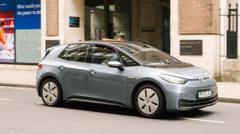Can a Monthly Subscription Boost Your VW's Power?

Volkswagen's New Subscription Model for Enhanced Power in Electric Vehicles
Volkswagen (VW), the renowned German automobile manufacturer, is taking a bold step in the electric vehicle (EV) market by introducing a subscription model for UK customers. This innovative approach allows buyers of select models in the ID.3 range to enhance their vehicle's performance by unlocking additional power through a monthly or annual subscription. With the automotive industry increasingly leaning towards subscription-based services, this strategy is a fascinating development that raises several questions about the future of car ownership and consumer expectations.
The Power Upgrade: What Does It Entail?
The optional power upgrade offers UK customers the chance to boost the performance of their ID.3 electric cars. For a fee of £16.50 per month or £165 annually, customers can enjoy a more powerful driving experience. Alternatively, a one-time payment of £649 grants a lifetime subscription, which is tied to the vehicle rather than the owner. This means that if the vehicle is sold, the new owner can also benefit from the upgraded power feature.
Why Volkswagen is Offering This Subscription
According to a VW spokesperson, the rationale behind this offering is to provide customers with choice. The spokesperson highlighted that similar options have historically been available in petrol and diesel vehicles, where customers could choose between engines of the same size but with different power outputs. The power upgrades aim to allow drivers to opt for a "sportier" experience without the burden of a higher initial purchase price.
The Controversy Surrounding Subscription Services
While the idea of a subscription service for automotive features is not entirely new, it has sparked controversy among consumers. Many car buyers express dissatisfaction at the notion of paying for features that are already integrated into their vehicles. This sentiment is echoed across the automotive industry, with other manufacturers like BMW and Mercedes having implemented similar subscription models for various features, including heated seats and enhanced acceleration.
The Historical Context of Power Upgrades
Historically, car manufacturers have offered various engine options for their vehicles, allowing customers to choose the power level that suits their preferences and driving style. This practice has roots in the traditional automotive landscape, where performance was often a significant factor in purchasing decisions. The introduction of subscription models, however, represents a shift from one-time purchases to ongoing payments, which can be seen as a double-edged sword for consumers.
Consumer Reactions to Subscription Models
Despite the convenience and flexibility that subscription services may offer, consumer reactions have been mixed. A survey conducted by S&P Global revealed a notable decline in the number of respondents willing to pay for connected services, dropping from 86% in 2024 to 68% in 2025. This trend indicates a growing wariness among consumers regarding the long-term financial implications of subscription-based features.
Market Trends and Future Implications
The wider subscription economy is flourishing, with market research firm Juniper Research estimating that the global subscription market could reach nearly $1 trillion (£740 billion) by 2028. This growth reflects an increasing acceptance of subscription models across various sectors, including technology, entertainment, and now, automotive. However, the challenge for car manufacturers lies in balancing consumer expectations with the financial viability of such models.
Comparative Analysis: Other Automakers
Volkswagen is not alone in exploring subscription-based enhancements for their vehicles. Competitors like BMW and Mercedes-Benz have also ventured into this territory. BMW has offered subscription services for features such as heated seating, while Mercedes launched a similar online subscription service in the United States in 2022. This trend indicates a shift in the automotive industry towards a more service-oriented model, where ongoing revenue from subscriptions could supplement traditional sales.
The Impact on Car Ownership
The introduction of subscription services for vehicle features could fundamentally alter the landscape of car ownership. The traditional model of purchasing a vehicle outright may shift towards a more flexible, service-based model. For consumers, this means more options but also the potential for increased long-term costs. Some may appreciate the ability to enhance their vehicle's performance without committing to a higher purchase price upfront, while others may feel frustrated by the notion of paying for features that could be considered standard.
Understanding Consumer Preferences
As the automotive industry navigates this transition, understanding consumer preferences becomes crucial. Many drivers seek value and transparency in their purchases. The idea of paying for features that seem inherently part of the vehicle may not sit well with all consumers. Thus, manufacturers must consider how best to communicate the benefits of subscription models while addressing potential concerns about affordability and value for money.
Long-Term Outlook for Subscription Services in Automotive
As more automakers explore subscription services, the long-term outlook for this model remains uncertain. While there is potential for growth in the subscription economy, the automotive industry must contend with the challenges of consumer acceptance. If manufacturers can demonstrate clear value in their offerings and address consumer concerns, subscription services may find a more permanent place in vehicle ownership.
Key Takeaways
- Volkswagen's subscription model allows customers to enhance the power of their electric vehicles.
- The industry is navigating a shift towards service-oriented models, with other automakers following suit.
- Consumer reactions are mixed, with a noted decline in willingness to pay for connected services.
- The long-term success of subscription services in the automotive industry will depend on consumer acceptance and perceived value.
FAQs about Volkswagen's Subscription Model
What is the cost of Volkswagen's power upgrade subscription?
The power upgrade subscription costs £16.50 per month, £165 annually, or a one-time fee of £649 for a lifetime subscription.
Is the subscription tied to the car or the owner?
The lifetime subscription is tied to the car, meaning it remains with the vehicle even if it is sold to a new owner.
Why are subscription models controversial among consumers?
Consumers may feel frustrated by the notion of paying for features that are already integrated into their vehicles, leading to concerns about value for money.
How has consumer sentiment changed regarding in-car subscriptions?
A survey from S&P Global indicated a decline in the percentage of consumers willing to pay for connected services, dropping from 86% in 2024 to 68% in 2025.
Conclusion
Volkswagen's introduction of a subscription model for power upgrades in its electric vehicles marks a significant shift in the automotive industry. As manufacturers explore new revenue streams and consumer preferences evolve, the implications for car ownership and the future of vehicle features are profound. With the rise of subscription services across various sectors, the automotive industry must find a balance that meets consumer expectations and offers true value. How will you approach the future of car ownership as subscription models gain traction? #Volkswagen #ElectricVehicles #SubscriptionEconomy
Published: 2025-08-15 14:20:16 | Category: technology



